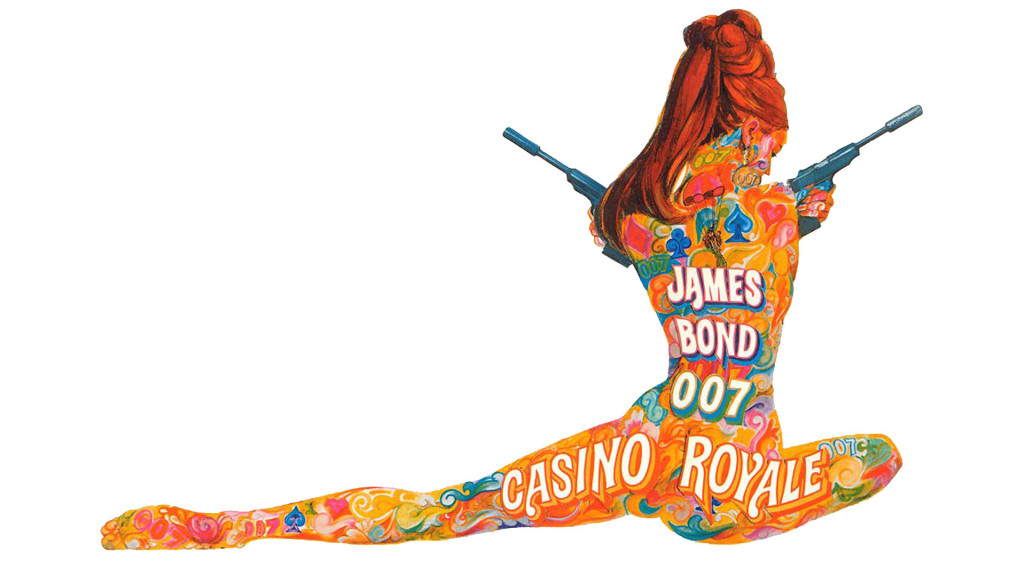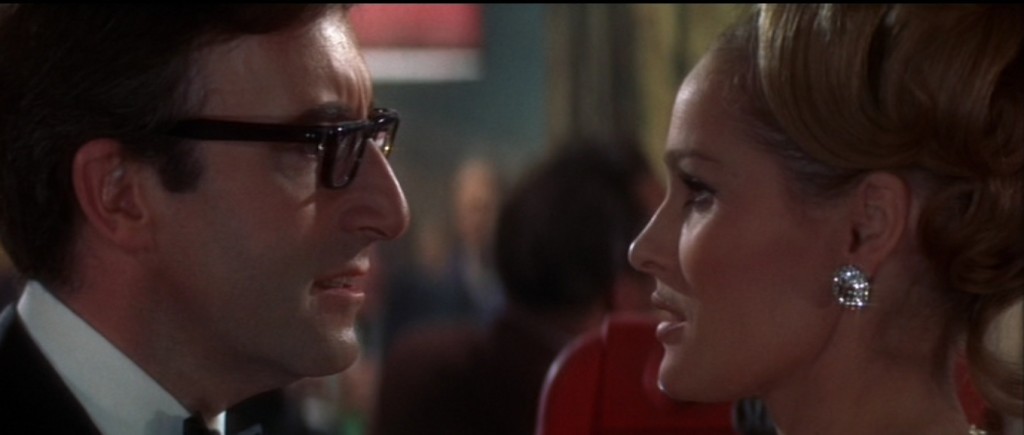Casino Royale (1967): Carnival and Clairvoyance
by Dr. Matt Finch (@DrMattFinch)
Royale-les-Eaux, France. A gaunt man enters a pissoir and approaches its other occupant, who lounges nonchalantly against the urinal’s wall.
—Mr. Bond?
—Yes.
—I’m Lieutenant Mathis of the Special Police. These are my credentials.
—They appear to be in order.
—Come with me.
It’s probably the strangest opening scene in the history of Bond movies. And this odd meeting leads into a uniquely picaresque adventure, one in which Ursula Andress kills James Bond twenty minutes before the film ends, a sexually insecure Woody Allen will attempt to avert a nuclear explosion using Alka Seltzer, and 007’s usual final-battle alliance of US Marines, submarine crews, or friendly ninjas will be augmented by cowboys and Indians, sheepdogs and seals… and Jean-Paul Belmondo.
Welcome to 1967’s Casino Royale.
You know, Skyfall wasn’t the first Bond movie in which our hero’s ancestral home goes up in flames. Right at the start of Casino Royale, an alliance of world powers attacks the mansion of our hero, James Bond, an ageing World War I veteran. (Perpetually 35-ish no more.) Only such drastic invasion of privacy can motivate Britain’s happily retired super-spy to take on one last mission. David Niven plays this reluctant Cold Warrior as a gallant Edwardian gent, “Sir James Bond 007.” The mainstream Bond usually sleeps with women in the employ of his enemies; his bedfellows then die for their troubles. Faced with the same situation, Niven politely declines the advances of SMERSH’s Deborah Kerr, causing her to, of course, reform and trade espionage for a nunnery.
Niven’s Bond harkens back to the roots of Fleming’s character in wartime and prewar imperial Britain. Nostalgia for British strength and leadership is writ large in this fussy, fatherly Bond; Niven lends the role his aura as the star of movies such as In Which We Serve and A Matter of Life and Death. Dismayed by contemporary “joke shop spies,’ he defeats SMERSH drones with nothing more than a shotgun and a pair of suspenders before heading back to base and declaring that all British agents will henceforth be known as James Bond 007, “to confuse the enemy.”
It’s an onscreen gesture that addresses Bond movies as a real-world media phenomenon. As Robert von Dassanowsky comments in his essay on Casino Royale, “By the release of Goldfinger, everyone wanted to be Bond; now everyone was.”
Among the numerous Bonds we find Terence Cooper’s “Coop,” the British Secret Service’s most sexually desirable agent, as selected by Miss Moneypenny. We see his Bond in a line-up of rival candidates – subjected to, and evaluated by, the female gaze, years before Daniel Craig swaggered forth from the surf. (And Niven’s renaming directive affects Moneypenny too, meaning that 1967’s Casino Royale also gives us a moment where 007 goes to bed with 007, completing the narcissistic circle implicit in every Bond film).
There’s also Woody Allen as a villainous, neurotic Bond living in the shadow of his famous uncle; Daliah Lavi as “The Detainer,” a female counterpart to Cooper; an unseen 007 who has “gone into television”; and Joanna Pettet playing Niven’s daughter by Mata Hari. (Her mother, Niven tells us, was “a great little dancer, terrible spy… whereas young Mata is a terrible dancer, might be a great little spy”).
If that wasn’t enough, we also have Dr. No‘s original Bond girl reinvented as another 007: Ursula Andress plays Vesper Lynd as a ruthless femme fatale who successfully murders one of our heroes and yet somehow manages to find herself literally on the side of the angels at the film’s end.
The spy killed by Andress is one of my favourite Bonds, Peter Sellers as baccarat expert Evelyn Tremble. This hapless nerd is recruited to become 007 and defeat Orson Welles’ villain at the card table, but he finds that being a studly superspy isn’t all it’s cracked up to be. When a temptress drugs his glass of champagne, he uses an antidote pill which fails to work; his bulletproof vest is “a little tight around the poison capsule compartment,” and although he can shoot the cork off a champagne bottle from across the room, he needs his thick, black-framed National Health Service glasses to do so.
The Evelyn Tremble suplot serves as a commentary on the boys’-own dream of being Bond, as a competent but ordinary man fails to fill the shoes of an impossible übermensch.
When Andress seduces and recruits him, Sellers’ Bond shows the uncomfortable, feigned nonchalance of a man dating out of his depth, and floundering. (—Martini? asks Vesper. —What about them? replies Tremble). Just as Moneypenny evaluates the male agents for sex appeal, once again it is a woman who subjects Bond to her gaze: Andress of the famous bikini is now fully clothed, photographing Bond in a series of increasingly ludicrous costumes as she gets the measure of him.
VESPER: Stand still!
[holds a light meter to EVELYN’s face]
I’m going to give you a five hundred at f2.
EVELYN: That’s the nicest thing that anyone’s ever said to me.
Sellers’ character tries to show off with press-ups and clowns around to hide his own discomfort; Andress takes the lead and he can barely manage to follow. At least he has the chance to dress as Napoleon, Adolf Hitler, and Toulouse Lautrec during his love scene, which is more consideration than anyone in a proper EON release ever got.
Inducted into the secret service, Sellers does slightly better with Jacqueline Bisset’s SMERSH floozy, but she still gets the better of him in the end. It’s only really in his drug-addled dreams, where the women are merely figments of his imagination, that “Evelyn Tremble” achieves true Bond-ian swagger.
Echoing Ian Fleming’s text, Sellers’ Bond later faces torture at the hands of Orson Welles’ Le Chiffre. (He is tied to a chair with no seat before enduring a psychedelic assault, a reminder that this parodic Casino Royale is more faithful to its origins than one might credit.) Poor old Evelyn Tremble thought he might be able to impersonate James Bond. Instead he’s driven out of his mind, then shot to death by the woman he was trying to rescue. (And you thought Daniel Craig felt betrayed by Eva Green.)
Here, 007 dies by the hand of the original Bond girl, in both senses: Ursula Andress of Dr. No playing Vesper Lynd from Fleming’s first novel. It’s small consolation for Tremble that, as the film’s closest thing to an Everyman, his ghost gets to condemn Woody Allen’s Bond to hell in the closing credits. Those credits include Mike Redway’s song, “Have No Fear, Bond Is Here,” which rounds off the movie’s closing whirl of soap-bubbles, deadly gunfire, and broad comedy:
The formula is safe with old 007
He’s got a red-head in his arms
Though he’s a lover,
When you are in trouble
Have no fear, look who’s here:
James Bond!
They’ve got us on the run
With guns
And knives
We’re fighting for our lives
Have no fear, Bond is here
He’s gonna save the world at Casino Royale
The jaunty tune seems doubly ridiculous, as Bond and his namesakes have been killed in a nuclear explosion. (It’s hard to tell whether the blast saves the world from Woody Allen’s villain or if it represents a kind of implied apocalypse in the style of Kiss Me Deadly.) As far as subversion of the Bond persona goes, it’s as if Daniel Craig’s Casino Royale concluded with What’s So Funny About Peace, Love, and Understanding instead of the Monty Norman theme.
Casino Royale (2006) ending Remixed from James Patrick on Vimeo.
The 1967 Casino Royale takes a lot of flak for incoherence and apparent self-indulgence. And don’t get me wrong – this is a very silly, very self-indulgent film made by people burned by the real-life business of Bond.
BOND: (searching for Vesper) You haven’t by any chance seen a young lady in a green dress?
CONCIERGE: Would that be a lady with a black bag over her head being manhandled by two unsavoury gentlemen?
BOND: Could very well be.
CONCIERGE: She went that way, sir.
You have to be in touch with your inner eight-year-old to appreciate the movie’s mix of flying saucers, Dr. Caligari-meets-the-Keystone-Cops, go-go booted gladiator women, and French cops with Scottish accents. But Casino Royale is jester and carnival: a season of masquerade and festivity. It is the unreasonable, indulgent, frustrating quality of filmmaking that allows chaos to provide a serious and highly prescient commentary on the ludicrous and increasingly self-referential pageant that the Bond series would become. The movie is a true burlesque that goes where no “official” Bond film ever could – and you should rightfully christen it your new favourite Bond.




